Home > Articles > Special Series > Bill Emerson: Between the Country Gentlemen and Jimmy Martin (1958-1962)
Bill Emerson: Between the Country Gentlemen and Jimmy Martin (1958-1962)

By the fall of 1958, Bill Emerson was ready to exit the Country Gentlemen, a band that he helped found and would become one of the most iconic bands in bluegrass music. Emerson would return to the Country Gentlemen just over a decade later, but in the late 1950s the speculation is that the Country Gentlemen were interested in riding the wave of the rising folk boom and thus were moving away from recording pure bluegrass and Bill wanted to continue playing bluegrass. So, Emerson made the move to another Washington, D.C. area band, Bill Harrell and the Rocky Mountain Boys (later Bill Harrell and the Virginians).
Bill Emerson and John Hall and the Bluegrass Partners
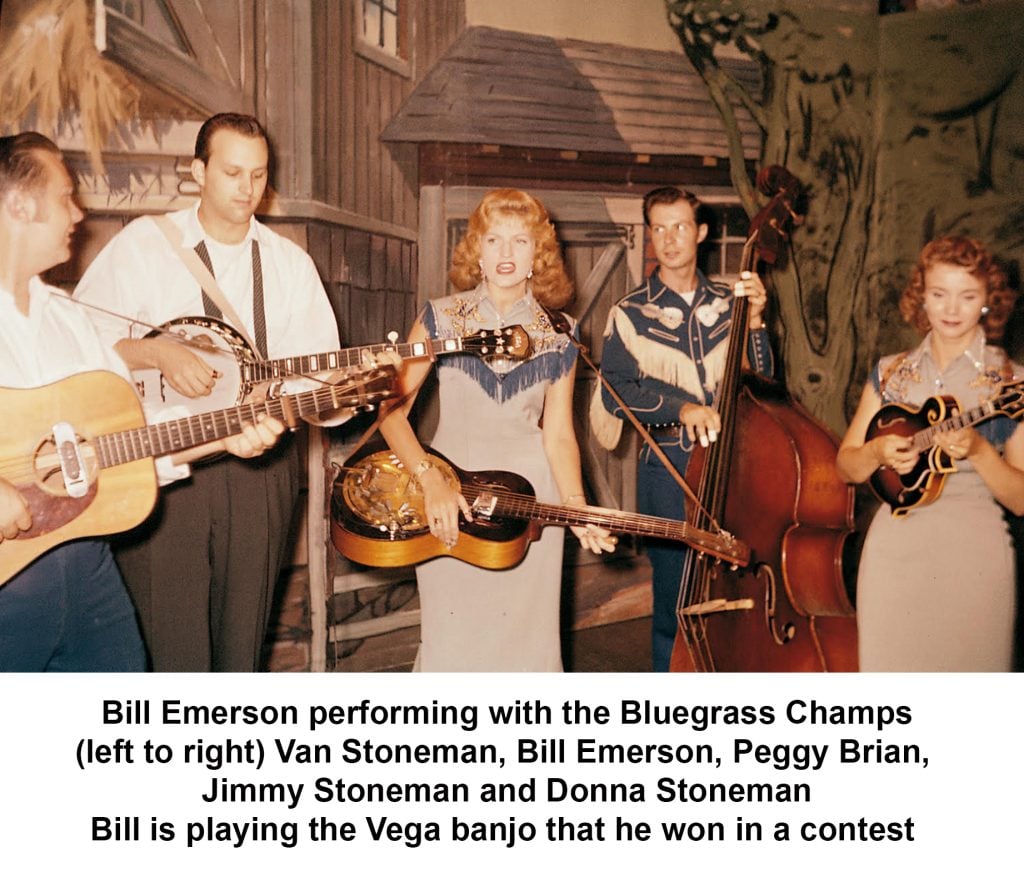
In addition to playing shows with Bill Harrell, Bill Emerson also stayed busy in the recording studio with various Washington, D.C. area bluegrass artists recording at Ben Adelman’s studio under the name Bill Emerson and John Hall and the Blueridge Partners. During the first session, in September of 1958, the group recorded the tunes “Deep South,” “Banjo Whiz” (also known as “Banjo Jamboree” or “Banjo Waltz”), “Windy Strings,” and “Blue Ridge Stomp.” The musicians on this session were Bill Emerson (banjo), Pete Pike on (guitar), Buzz Busby (mandolin), John Hall (fiddle), and Tom Morgan (bass).
Regarding his participation in this session, Buzz Busby said in an interview with Eddie Stubbs, in 1980, “Bill Emerson was helping me cut a session and Starday wanted him to cut an instrumental for them. I said, ‘Well, I’ll just help you, you help me, and we won’t pay nobody nothing.’ So, I helped him.”
Song credit on “Deep South” is given to Cindy Davis (aka Ben Adelman) and Don Pierce. Emerson’s son, Mike, asked him about the arrangement of this song. Bill’s response was, “I think I’d have to take credit for the arrangement. I have no idea what the correct title is. It sounds like ‘Whoa Mule Whoa!’ I know Ben Adelman and Don Pierce didn’t write the song.” During that era, it was not unusual for Starday to change the title of a recorded song and credit Adelman and/or Pierce. “Windy Stings” was actually the tune “Cora Is Gone.”
Regarding these tunes, the liner notes for the album Buzz Busby Going Home: Greatest Starday Recordings states, “The Emerson—Hall pieces were essentially cover versions of traditional tunes. For instance, ‘Banjo Whiz’ is actually the old-time tune ‘Shady Grove.’ Buzz can be heard laughing in the background on this track. ‘Windy Strings’ is an instrumental version of the 1950 Flatt and Scruggs recording ‘Cora Is Gone.’ Bill Emerson tunes his banjo to a D-tuning for this song.”
“Banjo Whiz” was written by Bill Emerson and was later included on a lot of various compilation records. Mike Emerson also asked his father about “Banjo Whiz.” Bill said, “In order to create excitement we played it as fast as we could and added the whoops and hollers. It turned out to be a hit and has received a lot of airplay over the years.”
In addition to the Emerson—Hall recordings, Bill also recorded a few cuts for Buzz Busby in the fall of 1958. The first was “Mandolin Tango.” Buzz had actually named this tune “Mandolin Tangle,” but when the engineer asked Buzz the name of the tune and said, “Mandolin Tangle,” the engineer wrote down “Mandolin Tango” and thus that is the name that appeared on the recording when it was released. The group that recorded on this session is the same as the last, with the exception of Vance Trull on bass instead of Tom Morgan. This group also recorded a Buck Owens vocal tune titled “I Don’t Mind.” Bill Emerson sang baritone, Pete Pike sang lead, and Buzz Busby sang tenor harmony.
In November of 1958 the same group of musicians, with the addition of Scotty Stoneman on fiddle, went into Adelman’s studio and recorded the tunes “Going Home,” credited to Busby and Stoneman, and “Me and the Jukebox,” credited to Cindy Davis (aka Ben Adelman). Regarding his relationship with Scotty Stoneman, Bill Emerson said, “Fiddle player Scott Stoneman was a mentor who encouraged me to get up on stage with them [the Stoneman family band the Bluegrass Champs], sit in and gain experience.”
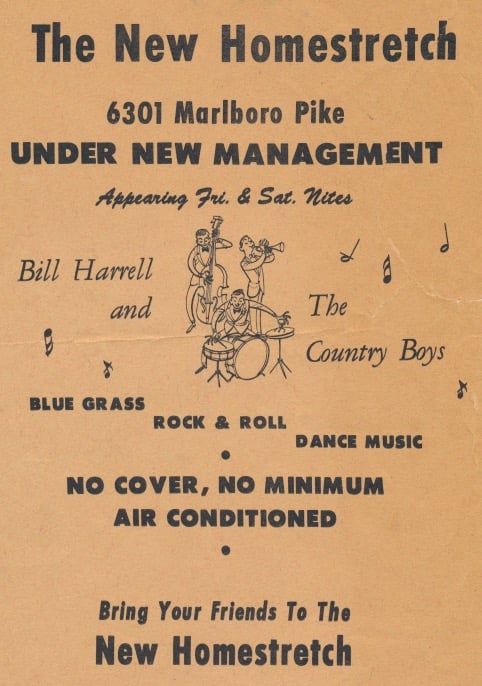
Regarding these two tunes, the liner notes—by Gary Reid—for the album Buzz Busby Going Home: Greatest Starday Recordings states, “Though credited to Buzz and fiddle player Scotty Stoneman, the song [‘Going Home’] was written solely by Scotty when he and Buzz were working in Baltimore with Mac Wiseman in the early 1950s. Buzz said that although Scotty wrote the song, ‘I got half the credit in exchange for recording it. He wrote it way back when he was working with Mac Wiseman. He was going to get Mac to record it, and for some reason, he chickened out and didn’t get Mac to do it. He should have; it would have been a good one for Mac. He got nervous and wouldn’t sing it for him. I’ll never forget it because Jack Clement actually took us to Baltimore that morning to make the broadcast and Scott pulled the song out and showed it to Jack. He said, ‘You know, that would be a good song for Mac.’ And Jack looked it over and he changed a couple of lines. I think one of the lines he changed was ‘I can see the children playing around the old wooden gate, and the little old country church where they sang ‘Amazing Grace’.’ I forget what Scott had in there; the lyrics weren’t too good. I don’t think Jack Clement even remembers he had anything to do with it.’ The other tune was a re-make of ‘Me And The Jukebox.’ He said of the song, ‘I wrote ‘Me And The Jukebox’ when I was 20 years old, and it’s haunted me ever since. It just squeezed in there and never would go away. That’s what I’m remembered by. It was the first song that I ever wrote that I really took any time out to compose. The other songs, I just jotted them down in about 15 minutes. I just wrote that one because I had the idea in my head and I thought it might be commercial. I don’t like it the best by any means.”
Bill Harrell and the Virginians
By April 1959, Bill Emerson was back in Ben Adelman’s studio with Bill Harrell and the Virginians. Unfortunately, two of the songs that were recorded by Bill Harrell that month were falsely credited on Starday releases as having Bill Emerson playing the banjo. These two tunes were “Top Hat Ramble” and “Tragic Highway.” It was Donnie Bryant who played the banjo on these tunes, along with Bill Harrell (guitar), Buzz Busby (mandolin), Roy Self (bass), and Carl Nelson (fiddle). Regarding “Top Hat Ramble,” Bill Emerson said, “The banjo picker on ‘Top Hat Ramble’ is Donnie Bryant, and that’s Buzz Busby playing mandolin. This tune, including the title, is obviously another Ben Adelman modification. It’s the Notre Dame fight song (‘Notre Dame Victory March’).”
The tunes that Bill Emerson did record with Bill Harrell that month were “I’ll Cry Again Tomorrow,” “Love Is A Stranger,” and “Reno Bound.” That session included Bill Emerson (banjo), Bill Harrell (guitar), Buzz Busby (mandolin), Roy Self (bass), and Scotty Stoneman (fiddle). On “I’ll Cry Again Tomorrow” Bill Harrell sang lead and Buzz Busby sang harmony. On “Love Is A Stranger” Bill Harrell sang lead, Bill Emerson baritone, and Buzz Busby tenor. On “Reno Bound” Buzz Busby sang lead, Roy Self sang baritone, and Bill Harrell sang the third part.
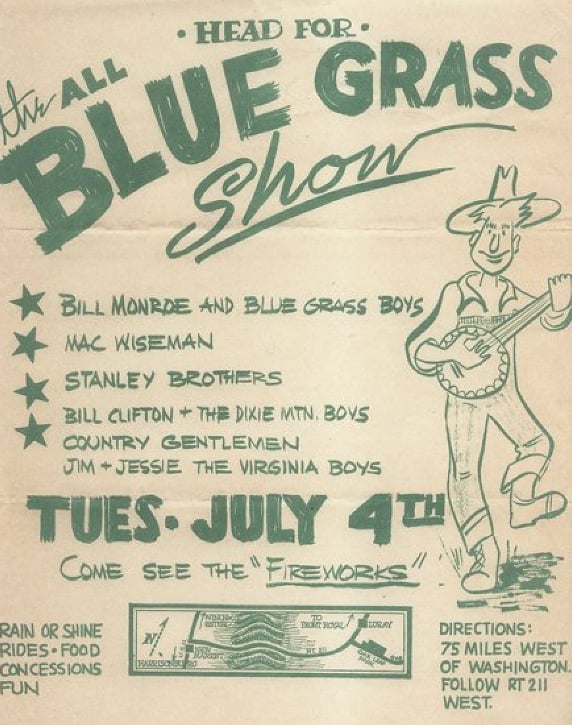
Another interesting recording that occurred in April of 1959 at the Adelman studio was Roy Self recording “Summer Sweatheart” under the name Roy Franklin. It was released on Empire Records. Regarding Empire Records, Bill Emerson said, “Empire Records was owned by the late Ben Adelman in Takoma Park, Maryland. It preceded WEBCO Records which was founded by Wayne (Busbice) Busby. Wayne and Buzz Busby had joint and individual releases with Empire. Most were rockabilly, but they never attracted much notice. I recorded several sides with Buzz on Empire and also with the late Roy Self. I played on Buzz Busby’s 45 rpm Empire recordings of ‘Pretty Polly’ backed by ‘Don’t Leave Me Alone.’ I also sang harmony on Roy Self’s ‘Summer Sweetheart.’”
Regarding his participation on “Summer Sweetheart,”—in an email exchange with his son, Mike, Bill Emerson said, “Roy played bass in Bill Harrell’s band among others, including the String Dusters Country Music band at Hunter’s Lodge near Centreville, Virginia and the Stardust Inn in Waldorf, Maryland. He was a disc jockey at WKCW radio in Warrenton for a couple of decades before he passed away. He went by the radio name of Itty-Bitty Buddy because he was 6’ 6” and a big man. ‘Summer Sweetheart’ was a self-produced, self-financed attempt at becoming a pop star. I wasn’t real keen on the teen idol style, but I sang on ‘Summer Sweetheart’ as a favor to Roy. We were both in Bill Harrell’s band and were recording in Adelman’s studio at the time. I think Bill called his band Bill Harrell and the Rocky Mountain Boys . . . later changed to Bill Harrell and the Virginians. There were three harmony singers: me, Carl Nelson, and I think Buzz Busby. I believe Ben Adelman had someone he knew come in and sing the high ‘Ahhhh’ part. The late Carl Nelson was a very good fiddler and a piano player. He played the piano on ‘Summer Sweetheart.’ It was recorded at the conclusion of a Bill Harrell or a Country Gentlemen session, but I don’t remember which. Both bands were recording for Starday at the time, sometimes on the same day. Ben Adelman was the person who recruited Bill Harrell and the Country Gentlemen for the label.”
In the summer of 1959, Bill Emerson also won the banjo contest at an event in Warrenton, Virginia. Additionally—with Bill Harrell on guitar, Roy Self on bass, and Carl Nelson on fiddle, and Bill Emerson on banjo—they won the band contest at the same event. About a year later, on July 4th, 1960, Bill won another banjo contest at Oak Leaf Park in Luray, Virginia and the prize was the first Earl Scruggs model Vega banjo off of the production line.
The next session with Bill Harrell and the Virginians occurred in September of 1959 when the band recorded “A Heart Never Knows” and “Eating Out of Your Hand” with Bill Emerson (banjo), Bill Harrell (guitar), Smiley Hobbs (mandolin), Roy Self (bass), and Carl Nelson (fiddle). On both tunes Bill Harrell sang lead and Buzz Busby sang tenor.
In 1959, Bill Emerson also recorded several tracks at Adelman’s studio with Buzz Busby and The Bayou Boys. Those cuts were “Don’t Come Runnin’ Back To Me,” “Cold and Windy Night,” “Pretty Polly,” and “Don’t Leave Me Alone.” “Don’t Come Runnin’ Back To Me” featured Bill Emerson (banjo), Buzz Busby (guitar), Scotty Stoneman (fiddle), and Jack Stoneman (bass) with Pete Pike and Buzz Busby singing lead. “Cold and Windy Night” featured Bill Emerson (banjo), Bill Harrell (guitar), Scotty Stoneman (fiddle), and Roy Self (bass) with Buzz Busby singing lead, Bill Emerson singing baritone, and Bill Harrell singing the third part. “Pretty Polly,” and “Don’t Leave Me Alone” were played by Bill Emerson (banjo), Wayne Busbice (guitar), Buzz Busby (mandolin), Roy Self (bass), and Carl Nelson (fiddle).
In March of 1960 Bill Emerson was, once again, in the studio with Bill Harrell to record “One Track Mind” and “I’ll Never See You Anymore” one these sessions the musicians were Bill Emerson (banjo), Bill Harrell (guitar), Roy Self (bass), Carl Nelson (fiddle) and John Duffey (Dobro).
As you might have recognized by now, from 1957 through 1960 Ben Adelman was bringing in a number of different Washington, D.C. area musicians to record tunes so that he could put them out, usually through Starday or Empire. Reading through the list of musicians who participated on each track, it appears that Adelman was bringing in whoever was available on the day and not really bringing in particular bands. In later compilation releases some of these recordings were released under various different band names.
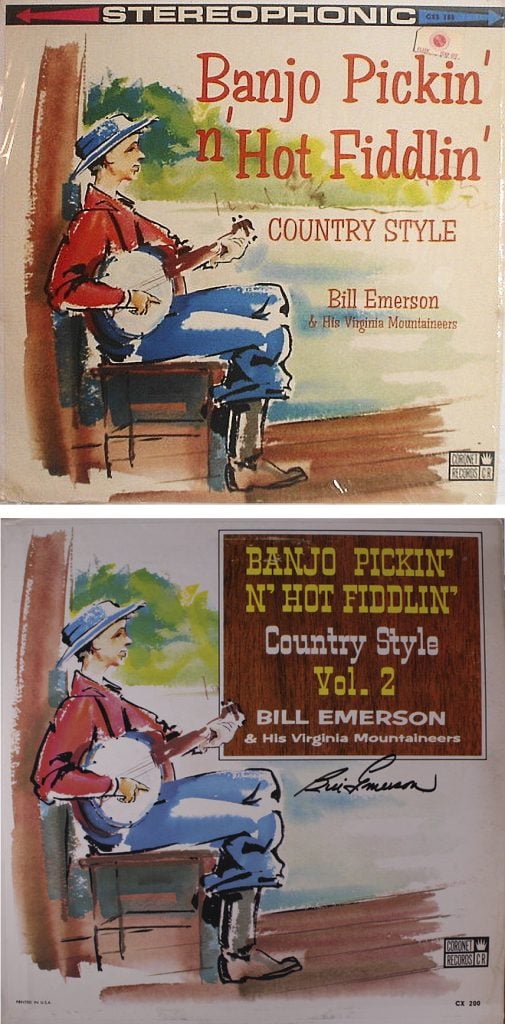
One such band name was Bill Emerson and His Virginia Moutaineers. This is a band that never actually existed as a performing or touring band. The “band” recorded a variety of material during 1960 and 1961. Most were standard instrumental tunes, but many were given different names by Adelman upon release. For instance, “Smokey Bill” was really “Black Mountain Rag,” “Horseshoe Blues” was “Fire Ball Mail,” “Banjo Harpo” was “Little Darlin’ Pal of Mine,” “Georgia Polka” was “West Virginia Polka,” “Henry’s Boogie” was “Travelin’ Down US Highway #1,” “Hogwash” was “Hey, Mister Banjo,” “Fingers on Fire” was “John Henry,” “Lightin’ Banjo,” was “Lonesome Road Blues,” etc. These tunes were released on Coronet Records as Bill Emerson & His Virginia Moutaineers Banjo Pickin’ n’ Hot Fiddlin’ Volumes 1 and 2.
Participants on these sessions included a who’s who of Washington D.C. area bluegrass musicians: Donnie Bryant (banjo), Bill Emerson (banjo), Bill Harrell (guitar), Smiley Hobbs (mandolin), Roy Self (bass), Carl Nelson (fiddle), Buzz Busby (mandolin), Red Allen (guitar), Tom Morgan (bass), Kenny Haddock (Dobro), Charlie Waller (guitar), and Frank Wakefield (mandolin).
After Bill Emerson had spent roughly a year and a half with Bill Harrell, Harrell got married and the group broke up. Bill Emerson then went to work with the Stoneman Family (Bluegrass Champs) for about six months. He would also occasionally play dates with Bill Clifton, Mac Wiseman, and Bill Monroe. The first gig that Bill Emerson played with Bill Monroe was during his time with the Country Gentlemen…sometime in 1957 or 1958. On that occasion, Bill Emerson was driving down Route 1 in Alexandria, Virginia and—out of the blue—he happened to see Monroe at a phone booth. Emerson stopped his car and approached Monroe. He noticed that Bessie Lee Mauldin was in the car. He walked up to Bill and asked if he could help with anything. Monroe said, “Yes! You can go change your clothes and get your banjo and play this gig with me.” During his early career, Monroe had approached Emerson on two occasions about becoming a member of his band. But, at both times Emerson was committed to another band and had to turn Monroe down.
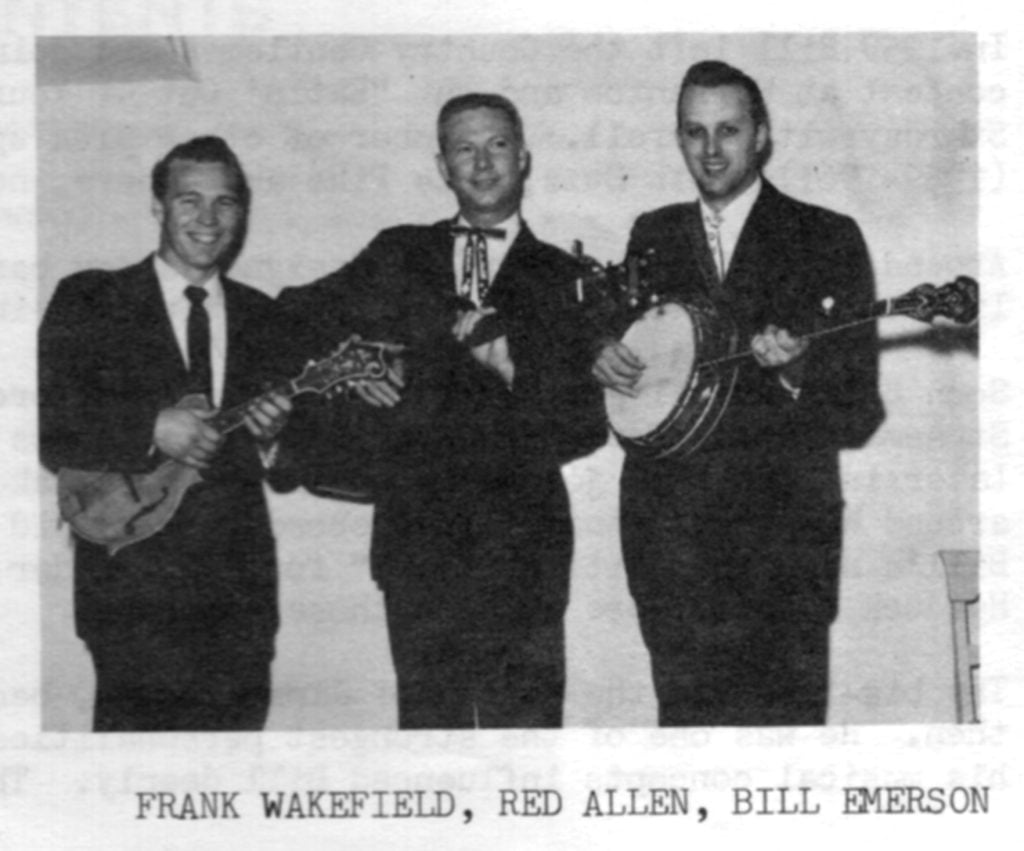
In 1961, Bill Emerson also recorded with country singer Luke Gordon (real name Ruffice Gordon Brown). This recording was made at a live performance in Oak Leaf Park in Luray, Virginia on July 4th, 1961. The musicians were Bill Emerson (banjo), Frank Wakefield (mandolin) and Luke Gordon (guitar). When Mike Emerson asked his father about this recording, Bill said, “Luke lived right here in Vienna. Luke’s wife worked for Tate and Bywater (law firm Mom and Dad used) in Oakton. Luke had a chance to make the grade in Nashville, but never did. Nevertheless ‘Dark Hollow’ was a big hit though he was never able to capitalize on its success the way Billy Grammar did with ‘I feel Like I Gotta Travel On.’
“Oak Leaf Park was an outdoor venue near Luray where weekend music events were held…much like Watermelon Park etc. I have no recollection of Frank Wakefield and I performing with Luke, but we probably did. I suppose Luke showed up without a band and asked us to back him up.”
In 1961 and 1962 Bill would also record two LPs with Harry and Jeanie West at Track Recording Studio in Silver Spring, Maryland. The musicians on those sessions included Bill Emerson (banjo), Jeanie West (guitar), Harry West (mandolin), Tom Morgan (bass), and Artie Rose (Dobro). Harry and Jeanie provided the vocals.
Bill Emerson’s next band gig was with Frank Wakefield and Red Allen. Regarding his time with Red and Frank, a 1968 article in Bluegrass Unlimited Magazine by Dick Spottswood and Gary Henderson reported, “Later in 1960 Bill joined forces with Frank Wakefield and Red Allen, working with them in and around Washington and making records. They did a couple of budget albums on Coronet under Bill’s name and “Little Birdie” for Rebel under Red’s name. Bill Baker (fiddle) and Kenny Haddock (Dobro) were also on these sessions.”
In addition to playing music, many musicians have to work “regular” jobs in order to help pay the bills. Bill Emerson worked a series of side jobs during his early years as a musician. The jobs that he worked during the 1958-1962 time period include being a service station attendant in Bethesda, Maryland; an auto salesman at Emerson & Orme in Washington, D.C.; a record distributor route man in Takoma Park, Maryland; a radio advertising salesman for WPFW radio in Manassas, Virginia; a hardware clerk at Peoples Hardware in Bethesda, Maryland; and a laundry routeman for Manhattan Laundry in Washington, D.C.
Bill Emerson left Red Allen and Frank Wakefield when he got a call from Jimmy Martin in 1962. The time that Emerson spent with Jimmy Martin is the next era of his distinguished career and will be covered in the next article in this series.
Share this article
5 Comments
Leave a Comment Cancel Reply
This site uses Akismet to reduce spam. Learn how your comment data is processed.
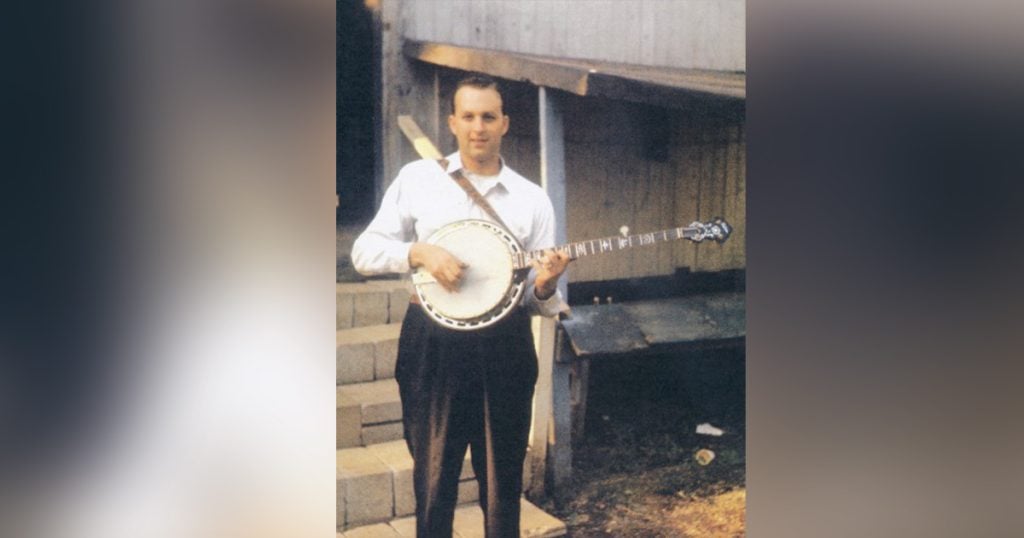
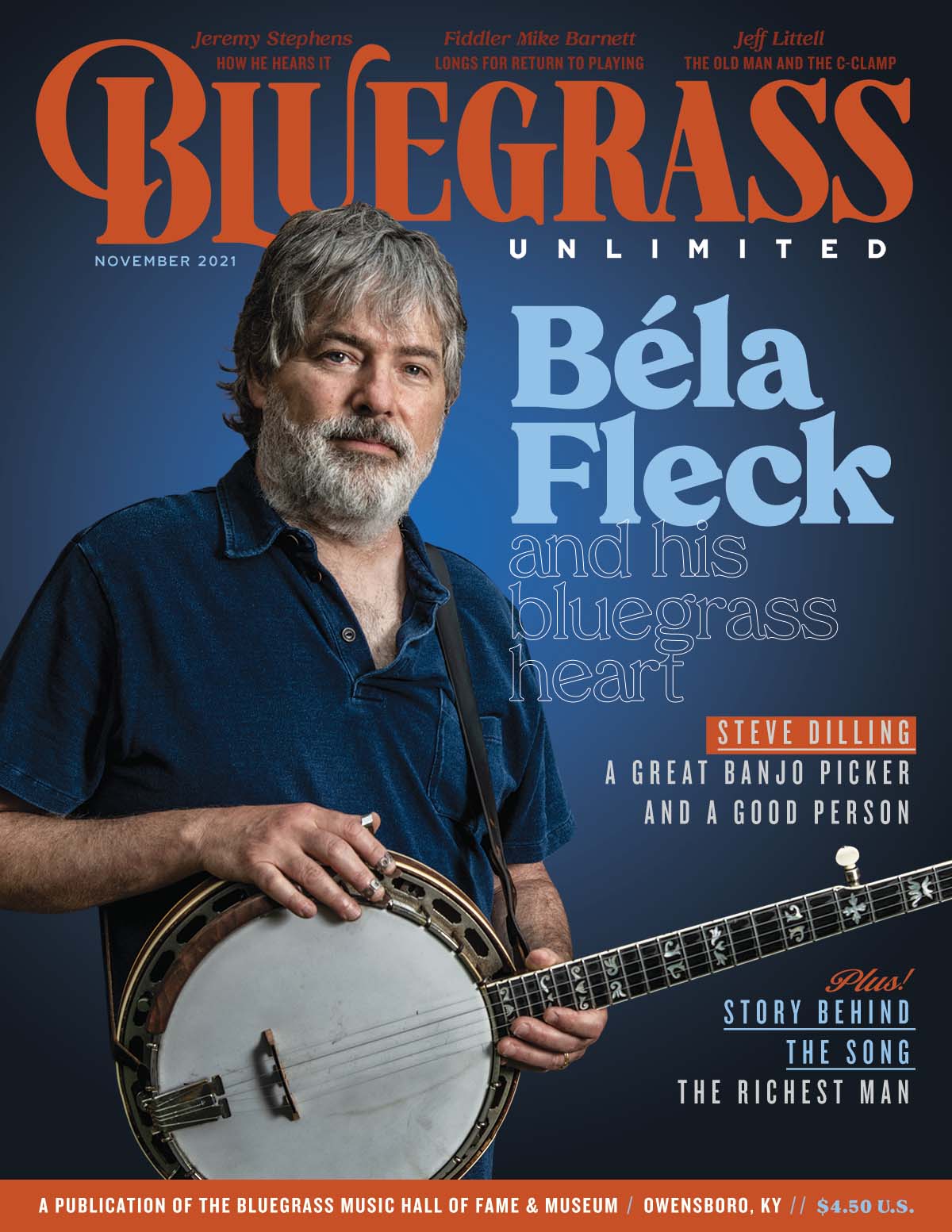
Nice article. I feel privileged to have known & played with a few of these fabulous musicans.
Enjoyed this history !
Absolutely awesome! I knew Bill for 46 years as my banjo teacher, friend and mentor. I don’t know half of what he achieved in his illustrious career! Can’t wait for the next part of this series!
I own the banjo Bill played around 1961-62. It had belonged to Rudy Lyle when he played with Bill Monroe. It’s a long story, see the upcoming book on Rudy by Max Wareham. I speculate it was the banjo Bill played on the Harry and Jeanie West albums.
The first bluegrass banjo song I ever heard was Bill playing
“ Little Maggie “ in 1960 over the radio via the WWVA Barn Dance show..I became hooked for life and just had to learn how to play the bluegrass banjo. Every time I play it I think of him. What a great human being and musician. Thank you Bill